-
Courses

Courses
Choosing a course is one of the most important decisions you'll ever make! View our courses and see what our students and lecturers have to say about the courses you are interested in at the links below.
-
University Life

University Life
Each year more than 4,000 choose University of Galway as their University of choice. Find out what life at University of Galway is all about here.
-
About University of Galway

About University of Galway
Since 1845, University of Galway has been sharing the highest quality teaching and research with Ireland and the world. Find out what makes our University so special – from our distinguished history to the latest news and campus developments.
-
Colleges & Schools

Colleges & Schools
University of Galway has earned international recognition as a research-led university with a commitment to top quality teaching across a range of key areas of expertise.
-
Research & Innovation

Research & Innovation
University of Galway’s vibrant research community take on some of the most pressing challenges of our times.
-
Business & Industry

Guiding Breakthrough Research at University of Galway
We explore and facilitate commercial opportunities for the research community at University of Galway, as well as facilitating industry partnership.
-
Alumni & Friends

Alumni & Friends
There are 128,000 University of Galway alumni worldwide. Stay connected to your alumni community! Join our social networks and update your details online.
-
Community Engagement

Community Engagement
At University of Galway, we believe that the best learning takes place when you apply what you learn in a real world context. That's why many of our courses include work placements or community projects.
2010
All Year 2010
NUI Galway Engineering Program Among Winners of Global Citizenship Award
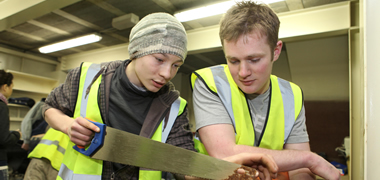
Thursday, 22 April 2010
-MacJannet Prize Awarded to Exceptional University Civic Engagement Programs- The Talloires Network and the MacJannet Foundation have announced that NUI Galway is among the winners of the second annual MacJannet Prize for Global Citizenship. The first time in history that an Irish education institution has been recognised for work in the area of civic engagement. The CAIRDE (Community Awareness Initiatives Responsibly-Directed by Engineers) service learning module received second place in the MacJannet Prize for Global Citizenship. Through CAIRDE all third-year Mechanical and Biomedical Engineering students apply academic knowledge and skills to address genuine community needs. Dr James J. Browne, President of NUI Galway on the announcement of the prize, said: "Service learning has become a hallmark of the student experience at NUI Galway and offers real learning in a community context. It brings theory to life while improving the lives of those living in often challenging situations. This international recognition for such commitment to civic engagement and service learning is a tribute to those involved". The MacJannet Prize, which is administered by the Talloires Network, received 66 nominations from 54 universities in 27 countries around the world. The prize recognises exceptional student civic engagement initiatives based in Talloires Network member universities around the world and contributes financially to their ongoing public service efforts. The Network is led by Presidents from over 200 universities throughout the world and builds a global movement of civically engaged and socially responsible higher education institutions. NUI Galway, through the Community Knowledge Initiative (CKI), became an active member of the Talloires Network in 2008. Since that time Lorraine McIlrath, CKI Coordinator became a Talloires Network Civic Engagement Expert and is sharing the work of NUI Galway through new partnerships forged in Jordan and the Lebanon to mention a few. McIlrath said that she is "absolutely delighted that NUI Galway's pioneering efforts in service learning have been recognised by such an esteemed organisation, placing Ireland on the map in terms of excellence and quality in service learning". Established in 2003 by Professor Abhay Pandit, and co-directed by Dimitrios Zeugolis, CAIRDE became an embedded part of the undergraduate Mechanical, Biomedical, and Electrical Engineering programmes as part of a required module that previously had been solely lecture-based. The emphasis is on interacting directly with intended beneficiaries of projects. Students have developed prototypes and projects that have created lasting change in communities beyond campus. Students at the University have shared their knowledge with children from disadvantaged communities through an annual scrapheap challenge; developed fold-up mobile wheelchair ramps; self-locking medicine cabinet; collapsible walking aid; device to help wheelchair users manoeuvre a wheelie bin. Professor Pandit said: "This award signifies to us that student engineers have a role to play in society and this role brings many benefits. Without doubt it has enabled our students to see their role as global engineers from challenging and engaging local experiences. The MacJannet Prize will help us shine a spotlight on this experience". Since the inception of the CKI, 50% of NUI Galway's course offerings have created a service learning component. The McJannet Prize will help nurture and further develop this pedagogy across Ireland. Other winners of the MacJannet Prize included first place winner PuentesUC (Bridges UC) at the Pontifical Catholic University of Chile. Joint second-place winners with NUI Galway are the HIV/AIDS Education and Prevention Program at University of Mines and Technology in Ghana and third-place prizes were also awarded to five additional outstanding programs from four continents: Community Builders, Wartburg College (USA); Humanity in Focus, University of Hong Kong (China); Student Leaders for Service, Portland State University (USA); Ubunye, University of Cape Town (South Africa); Vidas Móviles, Pontificia Universidad Javeriana (Colombia). The geographic diversity of the winning programs demonstrates the global scope of the movement to incorporate civic engagement within higher education. In all regions of the world, higher education institutions are responding to pressing social issues, and students in particular are championing the idea of global citizenship. The MacJannet Prize recognizes the winning programs as models for universities worldwide and will continue to encourage community engagement within higher education. -Ends-
>> Read full story about NUI Galway Engineering Program Among Winners of Global Citizenship Award
NUI Galway Researchers Detect Icelandic Volcano Plume Over Ireland
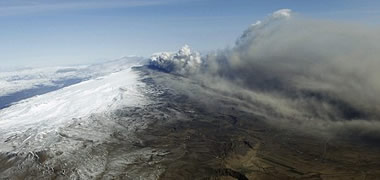
Wednesday, 21 April 2010
Researchers at NUI Galway have revealed that the volcanic plume from Iceland has been observed by specialised instrumentation installed at strategic boundary locations around Ireland. The volcanic plume was at the west coast at the NUI Galway Mace Head Atmospheric Research Station on Monday. Experts from the School of Physics and the Centre for Climate & Air Pollution Studies, NUI Galway, have monitored the development of the plume. By Monday afternoon the plume was observed to be about 200m thick over Mace Head, at 3km altitude but invisible to the naked eye. Through the night, the plume mixed into the surface level and continues to be observed through the day. The plume will have diluted significantly and is not likely to significantly impact on air quality. These episodes are only evident by contrast to the clean air which would be normally experienced at Mace Head. The most detailed information on the plume has been provided by the NUI Galway, Global Atmospheric Watch supersite, at Mace Head, on the west Galway coastline. Commenting on the observations, Professor Colin O'Dowd said: "The plume and its influences are clearly evident from a number of observations via real-time highly sophisticated in-situ instruments and remote sensing atmospheric profilers. At Mace Head we use some of the most advanced atmospheric instrumentation anywhere in the world. These instruments are designed to detect the pollutants from a range of events including volcanic eruptions". This is not the first volcanic emissions from Iceland that has been observed at Mace Head. "We last year published a paper on emission plumes from a non-erupting volcano event which occurred on 26 June, 2007 and, even more recently (10 days before the current eruption), we could detect volcanic plumes; however, the regional scale impact of the current plume is in a different league. Nevertheless, our atmospheric sampling capabilities demonstrate their critical usefulness in monitoring and event assessment" said Professor O'Dowd. Such observations along with modelling of the plume and regular forecasting of meteorological conditions are important contributions to decision making during the current circumstances. Professor O'Dowd added: "Even with precipitation, the vast majority of the volcanic pollution would be deposited to the surface and should not represent an air quality risk for the currently detected plume. The air pollution levels are well below the EU air pollution exceedence levels and do not represent a public health risk". The data from the Mace Head site on the west coast are strategically important for monitoring trans-boundary pollution and events such the current volcanic eruption. The value of data from such sites is clear during such occasions and helps us in assessment of how such events may impact on air quality". -Ends-
>> Read full story about NUI Galway Researchers Detect Icelandic Volcano Plume Over Ireland
NUI Galway Conference Highlights the Importance of Service Learning
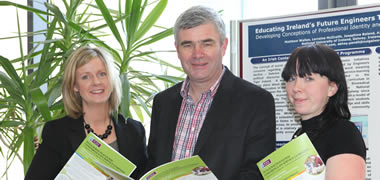
Monday, 19 April 2010
The Community Knowledge Initiative (CKI) at NUI Galway recently hosted the University's inaugural conference on Service Learning entitled, 'Creating Spaces for Civic Engagement - University and Community Perspectives'. Keynote speakers at the conference included Pádraig Ó Céidigh, Chairman of Aer Arann and Adjunct Professor with JE Cairnes School of Business and Economics, and NUI Galway President, Dr James J. Browne. The Conference highlighted the importance of civic engagement within the curriculum through Service Learning. Over 12 service learning modules were showcased from the perspective of students, community and academics. Pádraig O Céidigh, Chairman of Aer Arann, challenged the conference participants to think what is the world with them, rather than without them. He stressed that we are part of one big wheel and we can sit comfortably within the centre of the wheel or move to the edge and take some risks with meaningful outcomes. He encouraged NUI Galway to continue developing service learning and civic engagement opportunities for students so that we can create a culture of community innovation. Siobhan Lynch, NUI Galway Nursing graduate, spoke about her experience of undertaking service leaning in the Ranchod Aids Hospice for the dying in Zambia. She explained how this experienced had a pivotal effect on her career as she followed a nursing career in London in the largest HIV Unit in Europe at the Kings College Hospital. Service Learning is a teaching tool that enables students to connect their learning to community needs and issues vital to society though the guidance of academic staff. Students learn from engaging with communities by active participation and reflection. The ultimate goal of the CKI is to create 'graduate citizens' who will continue to engage with community throughout their personal and professional lives. At NUI Galway, to date over thirty degree programmes now incorporate a service learning experience whereby 800 students each year engage their learning in a community context. Lorraine McIlrath, Conference Convenor and CKI Coordinator, highlighted "that higher education is no longer the sacred cow and needs to be poked and provoked so that students have an opportunity to apply their learning in a real world problem solving context". McIlrath added: "The implementation of service learning modules at NUI Galway has proven that this model works for our students as they have realised academic opportunities where they can problem solves in a real world community context". Third-year students completing degree programmes in Electronic and Electronic and Computer Engineering recently held a public poster exhibition highlighting innovation technology based solutions, which they have developed to address some daily challenges experienced by various groups with disabilities. This work was completed as part of a service learning project module undertaken by all third-year Electrical and Electronic Engineering students with support from Galway community organisations such as Enable Ireland, the National Council for the Blind of Ireland and DearHear.ie. Second-year BSc Biomedical Science students recently completed a new CKI module where students worked on six separate projects with different community groups including local secondary schools and the African community in Galway. Projects included a feasibility study designed to assist second level students with the concept, research and development of science projects suitable for inclusion in the "Young Scientist of the Year" competition. Another group worked with students in the Jesuit secondary school in a collaborative production of a docudrama on drug awareness while another initiative was the design of an educational awareness programme for visiting friends and relatives of the African community in Galway with respect to malaria prevention. The School of Geography and the College of Engineering and Informatics at NUI Galway recently organised a poster exhibition to reflect on and support the activities of a range of national and international Non-Governmental Organisations (NGO). The exhibition was the outcome of a successful collaboration between Postgraduate Geography, Third Year Engineering and Third Year Project Management students jointly developing critiques of a number of NGOs with a view to assisting them to view their activities and strategies from a range of geographical and engineering perspectives. These reviews have led to the production of a set of evaluation reports, which aim to assist NGOs to view their activities and strategies from a range of geographical and engineering perspectives. This multi-disciplinary module, entitled 'Managing Development', involves 19 students from the School of Geography and Archaeology, and 150 students from the College of Engineering and Informatics. -Ends-
>> Read full story about NUI Galway Conference Highlights the Importance of Service Learning
Four NUI Galway Students Receive Gaisce Gold Award
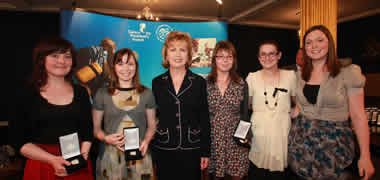
Monday, 19 April 2010
Four NUI Galway students were among a special group of young people presented with the Gaisce Gold Award by President Mary McAleese, Patron of Gaisce – the President's Award, at a special ceremony in Dublin Castle recently. The NUI Galway awardees were Anne Browne from Lifford, Co. Donegal, Fiona Gillespie from Naas, Co. Kildare, Jennifer Jones from Middleton, Co. Cork and Aideen Óg MacInerney from Taylor's Hill, Galway City. This year marks the 25th Silver Anniversary of Gaisce which is the National Challenge Award for young adults. The President's Award is the highest Award in Ireland for young adults and coming from the President it is the most prestigious. The Awards were presented to 50 young people from all over Ireland in honour of their work in communities, sports and adventurous pursuits. Ann Browne is a fourth year Bachelor of Science in Occupational Therapy student at NUI Galway. Ann joined the Gaisce Society on her arrival at the University where she acted as treasurer and organised fundraising events to support the society trip to Estonia. This trip involved the society working with underprivileged locals to help with the re-generation of their local park as well as teaching at the local primary school. PhD student Fiona Gillespie volunteered with the Writers Society at NUI Galway where she read stories to the patients in the Children's Unit at the University Hospital Galway. The society also encouraged the children to write their own poems and stories. As a member of the Writers Society Fiona was involved in the construction of a 'Poetry Wall' for the Galway Arts Festival. She is also a member of the NUI Galway Juggling Society and is now an instructor at events such as Oxygen and Electric Picnic. Jennifer Jones, a Medical student at NUI Galway, achieved her Bronze and Silver awards as a pupil at Christ King Girls Secondary School in Cork. As a volunteer with the NUI Galway Suas Society, Jennifer worked with the Galway Refugee Support Group for her community involvement challenge. This challenge involved planning and preparing weekly classes and activities for the home work club. Jennifer has used this experience working as a teaching assistant in India. Jennifer completed her Gaisce challenge by taking part in a community building project in Estonia. NUI Galway Bachelor of Arts student Aideen Óg MacInerney studies History and joined An Cumann Stair as part of her community involvement. She has helped to organise the NUI Galway Arts Society Ball and developed the society's web page. Aideen is a 10k runner and added the physical recreation section to her Gaisce Gold challenge. President of NUI Galway, Dr James J. Browne, said: "I am delighted to congratulate Fiona, Anne, Aideen Óg and Jennifer on their Gasice Gold Awards. At NUI Galway we encourage all students to prioritise civic engagement and volunteerism, so it is especially heartening to see four of our students receive their Gaisce Gold Awards for a wonderful range of community, sporting and civic contributions". -Ends-
>> Read full story about Four NUI Galway Students Receive Gaisce Gold Award
Botany & Plant Science Student to Present at National Science Speak Competition
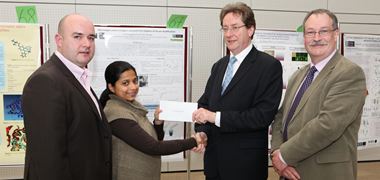
Monday, 19 April 2010
Ms Merry Zacharias, a PhD student at NUI Galway in the Discipline of Botany and Plant Science within the School of Natural Sciences will represent the University at the National Science Speak Competition to be held in Dublin on 27 April 2010. Science Speak is an annual inter-varsity science communication event involving all seven Irish universities where postgraduate research students are challenged to present their research work to the general public in non-expert language. The talk on 'Marine Algae: the missing link to cloud formation? Investigations on the emission and exudation of organic compounds' won the local heat of the competition. Merry's PhD focuses on the responses of marine algae (seaweeds and microscopic phytoplankton) to environmental stresses and the key role algae play in climate change research. Algae release organic compounds into the air and seawater which can make a significant contribution to the formation of clouds over the oceans and thereby affect our climate. Merry is conducting her PhD in the Algal Research Group in Botany and Plant Science under the supervision of algal expert Dr Dagmar Stengel. Her research is funded by the Environmental Protection Agency (EPA) as part of a larger interdisciplinary project on climate change entitled 'Exchange at the air-sea interface: air quality and climate impacts' at the Centre for Air Pollution and Climate Change at NUI Galway. Before starting her PhD in Botany and Plant Science at NUI Galway, Merry completed an MSc in Environmental Science at Bharathidasan University in India and worked as a project assistant at the Indian Institute of Science, Bangalore (India). She was also employed as a research assistant at the Environmental Change Institute, NUI Galway. Merry Zacharias is one of 20 PhD students currently conducting research within the Discipline of Botany and Plant Science at NUI Galway. ENDS
>> Read full story about Botany & Plant Science Student to Present at National Science Speak Competition















